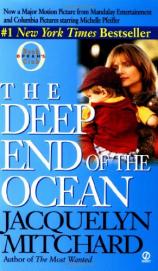Reading Group Guide
Discussion Questions
The Deep End of the Ocean

1. Beth and Pat deal with their grief over Ben in quite different ways: while Pat goes through the "normal stages," Beth is by turn stoic and hysterical; at times she feels as if her slightest move would cause an avalanche. What is this avalanche about? Do you think it is characteristic of men and women to deal with grief -- or the loss of a child -- differently?
2. Beth Cappadora in no way resembles an ideal mother, yet no one could question her love for her children. How does Beth express this love? Do you think she was a "sloppy" mother before Ben's disappearance? And after?
3. Beth points out that the divorce rate of grieving parents is eighty percent. Why is it so hard to sustain a marriage after losing a child? And why do you think Beth and Pat are able to stay together throughout their ordeal? Do you think their marriage will ultimately succeed?
4. Mitchard reveals Vincent to us in stages, allowing us to see him develop from a typical older brother to a troubled teenager. How effectively does she convey Vincent's complex feelings about the loss of Ben and about his parents? How does Ben's disappearance -- and Vincent's own role in the incident -- shape his personality as he grows older?
5. Both Vincent and Ben are known to the outside world by different names. What is the significance of these "aliases"? Why does Mitchard herself refer to Vincent as Reese in his named chapters? In your own mind, which names are the most appropriate for each boy?
6. In many instances Beth reacts angrily when her family expresses hope for Ben's return. Do you think it would have been easier on the family if they were to discover -- or have a real reason to believe -- that Ben had died? Why is the possibility of his being alive so painful to Beth? Do you fault her for being willing to believe that her son is dead?
7. Although it is difficult to imagine how any good could come out of the Cappadoras' tragedy and its aftermath, can you make an argument for what is often referred to as the "healing power of grief"? Has anyone in the family benefited from the experience of losing Ben? What kind of family would they have become had their lives not been torn apart?
8. Watching Sam (Ben) interact with her family, Beth thinks to herself that he is "not of this world." She realizes that George and Cecilia were loving, caring parents; perhaps in some ways better parents than she and Pat would have been. Do you think that Sam -- and the Cappadora family -- would have been better off if they had remained strangers? What parts of his personality as their birth child were preserved over the course of his years with George? How is he the Cappadoras' child, and how is he George's child?
9. The title, The Deep End of the Ocean, refers to Ben's first, timid reaction to a large body of water. Later in the novel, Beth reflects that Ben has indeed been to the ocean's deep end, and returned. What does the title mean to you? How have other members of the Cappadora family been to The Deep End of the Ocean?
10. Recurring throughout the novel is the image of a cedar chest -- as a coffin, as a storage for keepsakes, as a hiding place for Ben. What does the image of the chest evoke for you? Is it fearful or comforting? Claustrophobic or cozy? Why would a child be drawn to such an object?
11. Reunions play an important role throughout the story. What different kinds of reunions take place? Are these events generally pleasant or painful experiences for the characters involved?
12. After Ben's disappearance, Beth ceases to communicate with just about everybody, except Candy. Why do you think Beth turns to Candy instead of all the other people who love her and have tried to help her?
The Deep End of the Ocean
- Publication Date: February 1, 1999
- Mass Market Paperback: 448 pages
- Publisher: Signet
- ISBN-10: 0451197747
- ISBN-13: 9780451197740









